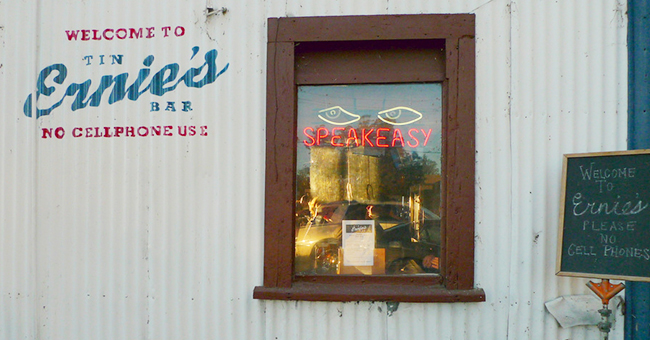Bartenders see it all the time: a customer who spends more time with their phone than with their friends. Social media has become such an integral part of life — and a marketing strategy — that most bars are hesitant to ban smartphones altogether. But excessive phone use can turn a warm and friendly gathering place into a cold and lifeless business, motivating many bars to restrict how and when customers can use their phones.
Ernie’s Tin Bar in Petaluma, about 40 miles north of San Francisco, has several prominent signs saying cell phones aren’t allowed. In practice, the bar allows texting, photo-taking and other quiet person-to-phone interactions and only bans phone conversations. However, owner Ernest Altenreuther says a lot of people won’t even bring their phones into the bar because they’re nervous about breaking the rule or changing the atmosphere of the bar.
“It’s annoying to be sitting there at the bar and have someone talking on the phone rather than talking to other people,” says Altenreuther, whose great-grandfather opened the bar in 1923. Banning cell phones, he says, “promotes a more social environment where people are speaking to each other.”
 Genuine, face-to-face conversation is encouraged at Ernie’s Tin Bar, where cell phones are not allowed.
Genuine, face-to-face conversation is encouraged at Ernie’s Tin Bar, where cell phones are not allowed.
Score on Davie, a sports bar in Vancouver, doesn’t have an explicit “no phones allowed” policy posted. But the bar encourages customers to focus on each other by offering to lock phones in a box that only the bartender has the key to.
“We strongly feel that if you are going out to an establishment to socialize, the focus should be on interaction, not iPhone action,” says General Manager Rob Turpin. Locking up your phone is “the right thing to do.”
The people at the table decide the consequences for breaking the no-phone rule. The penalty could be buying a round of shots for the bar, or it could be something that spurs more social interaction, such as introducing yourself to a stranger.
“The majority of guests initially have fears of withdrawal before agreeing to the lockbox, but those fears are assuaged once they interact with their friends,” Turpin says. “Of course, there are guests who cannot be separated from their devices with a crowbar.”
With more people turning to social media for recommendations before going out, bars are missing a big opportunity if they restrict smartphone activities like posting photos to Instagram and Yelp or chronicling their night on Twitter, according to David Spiegelman, vice president and creative director at Wagstaff Digital.
“We’ve had Michelin-starred restaurants refuse to allow pictures at the table for years, and now they have the social handles right on the menu and encourage people to share their experience,” says Spiegelman, who runs the company’s social media and creative services departments with restaurant, bar and hotel clients around the country.
“I think you have to make a choice: Do you want a phone-free environment or do you want all your customers with a smartphone to be brand ambassadors through social media? For most businesses targeting a millennial crowd, they’ll pick the latter,” Spiegelman adds.
Green Russell, a speakeasy-style bar in Denver, asks customers to step into its vintage telephone booth to use their cell phones. But managing partner and owner Adam Hodak says that in a bar that often serves 550 people over seven hours, it became too taxing to police customers’ phone use. Now the bar only steps in if smartphone activity is disruptive.
“We have had foodies that take a bunch of photos of everything and the flash photography becomes overwhelming, so we’ll ask people to step outside their own bubble,” says Hodak. “If you’re not being loud or offensive, we’re not going to sit there and act like your mother or father at dinner. We use [the no-phone policy] more like crowd control.”
Spiegelman has seen phone bans work, but warns that they won’t work for everyone.
“It really comes down to the theme and culture of the bar or restaurant. Soho House restricts its guests and members from taking photos, and it works,” he says. “Know your patrons and don’t mandate something without a purpose. Celebrities want privacy; 22 year olds want Instagram likes.”




